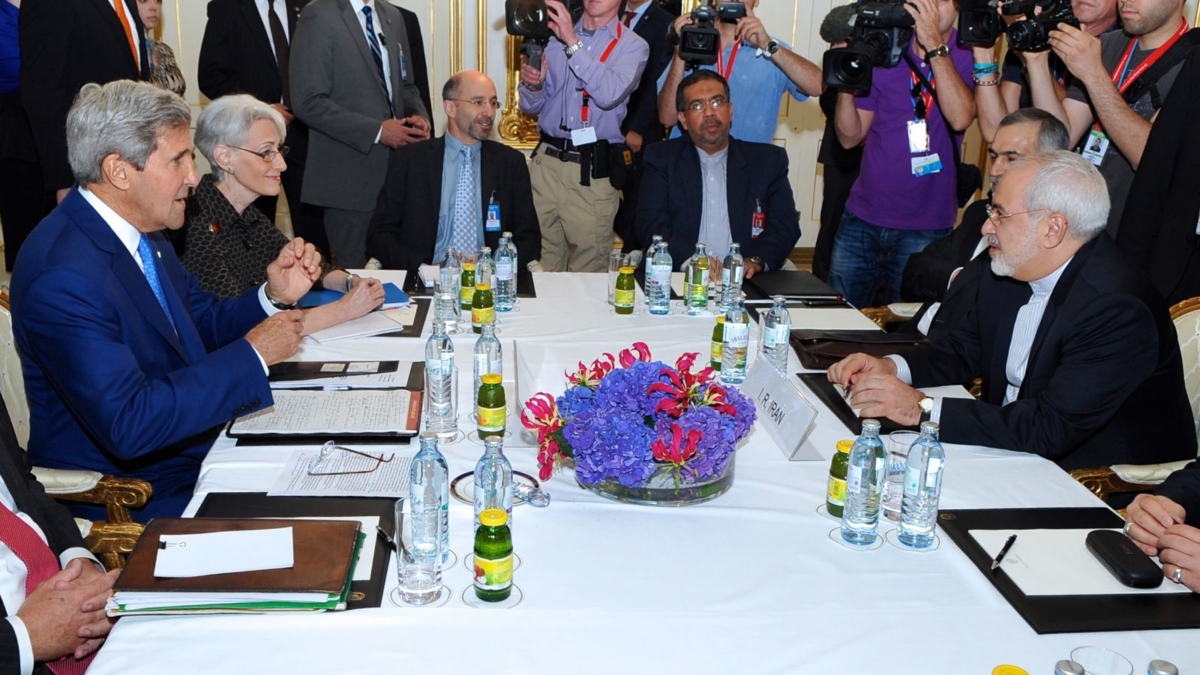World Policy On Air is a new podcast from the pages and website of World Policy Journal.
WPJ Conversation with Qiu Xiaolong
By Westerly Gorayeb and Nellie Peyton
Michael Deibert: A Note on Violence at Jawaharlal Nehru University
 In early 2007, while reporting on the conflict in India-controlled Kashmir, I sat at a small tea shop in Srinagar discussing the political trajectory of this troubled region with two friends—a Kashmiri attorney named Malik Aijaz Ahmad and a student named Idrees Kanth.
In early 2007, while reporting on the conflict in India-controlled Kashmir, I sat at a small tea shop in Srinagar discussing the political trajectory of this troubled region with two friends—a Kashmiri attorney named Malik Aijaz Ahmad and a student named Idrees Kanth.
I saw in Kashmir, as I have in other countries such as Haiti and Côte d’Ivoire, how the majority of the populace was caught in a vicious war of attrition between opposing sides with very little recourse or protection. Witnessing the situation in Kashmir led me to write my first long-form feature for World Policy Journal, the flagship publication of the New York-based World Policy Institute, where I have recently been named a senior fellow.
During my time in India, I also became aware of the country’s complicated religious and ethnic dynamic. On one hand, this saw frequent and repeated episodes of discrimination and violence against the country’s Muslim minority, including the murder of some 2,000 people—the vast majority of them Muslims—in a bout of ethnic cleansing in the state of Gujarat in early 2002. On the other hand, representatives of the Muslim community in India could also often behave in ways that reeked of intolerance, such as when members of the Majlis Ittehadul Muslimeen (MIM) political party, including Indian lawmakers, attacked the Bangladeshi writer Taslima Nasreen as she attempted to speak at a book release event in the city of Hyderabad in 2007.
A recent email from Idrees, studying at New Delhi’s Jawaharlal Nehru University, demonstrates vividly to me that these tensions evident in Indian society as a whole do not shy away from rearing their heads even in a university setting. If communal violence, such as that which India witnessed in Gujarat in 2002, is also allowed to flourish in places of higher learning such as Jawaharlal Nehru University, it is a worrisome sign for a country that this month undertook another exercise in its vast experiment with democracy.
Jodi Liss: Breaking the “Resource Curse” by Getting Contracts Right
 Many countries in the developing world look to energy and mining to bring in foreign investment. The contracts that these countries sign with extraction companies often offer lop-sided terms when it comes to money, transparency, information, or in certain cases, environmental protection to the host country—all of which heighten the problems of the resource curse.
Many countries in the developing world look to energy and mining to bring in foreign investment. The contracts that these countries sign with extraction companies often offer lop-sided terms when it comes to money, transparency, information, or in certain cases, environmental protection to the host country—all of which heighten the problems of the resource curse.
The International Senior Law Project (ISLP) is a non-profit organization which volunteers world-class legal counsel globally on economic development, human rights, and access to justice. The group works with governments who need their services but are too poor to pay, and partners with large established non-governmental organizations (NGOs) to bring their skills to developing world civil society groups. They also offer commercial law skills training. They have worked on projects to deal with extraction related problems in several poor countries, including in Mongolia and Liberia.
ISLP’s roster includes about 600 lawyers from the United States, Canada, and other countries. Jean Berman, the executive director, says, “We’ve been very lucky in finding the perfect lawyers for the situation.”
Joseph Bell is the Secretary of the Board for ISLP. He is also a senior law partner at Hogan and Hartson, and chair of the Advisory Board at Revenue Watch Institute, an NGO which works to counter the resource curse. His background is in commercial and regulatory practice, focusing on energy and mining. Recently, he led the ISLP team(s) that renegotiated several important contracts between the government of Liberia and interested multinational corporations, resulting in a great improvement of terms for the government.
The following is an interview with him on negotiating with extraction companies for the world’s poorest countries.
– – – –
Jodi Liss (JL): What problems do developing countries face when negotiating contracts with these huge multinational corporations?
Joseph Bell (JB): There’s the problem of asymmetry—in knowledge, information, capacity—between the government and the company. Some countries recognize this and hire outside counsel, which sometimes can help.
JL: Do these countries have the existing legal frameworks to guide these contracts?
Obama’s First 100 Days — John Delury: North Korea
 John Delury’s article “North Korea: 20 Years of Solitude” appeared in the winter “Dear Mr. President” issue of World Policy Journal. His grade for the new administration’s first 100 days follows this update.
John Delury’s article “North Korea: 20 Years of Solitude” appeared in the winter “Dear Mr. President” issue of World Policy Journal. His grade for the new administration’s first 100 days follows this update.
President Barack Obama’s policy team is making inroads on a less hostile, more direct relationship with states like Iran, Syria, Venezuela, and Cuba. The manifestations may look ad hoc—a friendly video message; conference sideline handshakes; partial lifting of travel restrictions; dispatch of envoys to a rarely-visited foreign capital. But the sum total indicates a new spirit animating American foreign policy toward troublesome, alienated, or “rogue” countries. A kind of axis of engagement seems to be taking shape.
There is one noticeable exception: the Democratic People’s Republic of Korea (DPRK), a spoke in the wheel of George W. Bush’s “axis of evil.” One hundred days into the Obama Age, it hardly feels like the beginning of a new era in U.S.-North Korea relations. Considering the extremely narrow channels of communication between the two countries, there is ample room for misunderstanding, conflict, and perception gap, even in so short a time. Foreign policy elites in Washington and Pyongyang may be telling themselves very different stories of what’s happened since January.
How would North Korea’s ruling elite evaluate Obama’s first 100 days, and what questions are they asking themselves about this new American leader?
Transition politics and envoy diplomacy in the early days of the Obama administration may have sent Pyongyang the signal that any new departure in U.S.-North Korea relations, for better or worse, will come at North Korea’s initiative. In fact, day one of the Obama era was a disappointment for the DPRK since the president’s inauguration team snubbed an unusual North Korean request to send an envoy to the inauguration ceremony. The rejection barely made headlines and it seemed prudent at the time for a young progressive president to not appear coddling of tyrants.
But in retrospect, the White House may have squandered an easy opportunity to give face to Pyongyang, opening the door for engagement and respect, without giving anything concrete away. Pyongyang showed initiative in wanting to send an emissary to witness the historic moment of Obama’s inauguration; Obama’s team may have mistaken this opportunity for one of many to come, rather than for the litmus test that—in the eyes of Pyongyang—they failed.
From Pyongyang’s perspective, the second negative indicator was the relative delay in appointing a special representative on the North Korean issue.
Two days after inauguration, Secretary of State Hillary Clinton and Vice President Joe Biden personally announced, with great fanfare, the appointment of a special envoy for Middle East peace and special representative for Pakistan and Afghanistan. But a special representative for North Korean policy was not announced for another month, during which time North Korea experts warned of the importance of staying ahead of North Korea diplomatically, and obviating Pyongyang’s need for attention-grabbing brinkmanship.
The appointment of Ambassador Stephen Bosworth, a highly-respected diplomat who had recently traveled to Pyongyang, was itself second-guessed, even in South Korea, for the fact that he was keeping his day job as dean of the Fletcher School of Law and Diplomacy at Tufts University. At the time of his appointment as Af–Pak rep, Richard Holbrooke was serving as chairman of the Asia Society—where I work—and it would have been inconceivable that he carry on in that capacity. The delayed appointment of a half-time envoy to North Korea must have had a deflating effect for anyone high-up in Pyongyang who hoped for “change.”
The third sign to Pyongyang that there was nothing terribly new in Obama’s approach to the peninsula was Clinton’s Asian tour.
The Secretary sent well-crafted, friendly, and respectful bilateral messages in Tokyo, Seoul, and Beijing. East Asia lauded her trip as a resounding success. But one casualty of her astute bilateralism was the message received in Pyongyang. Clinton met with the families of abductees in Japan and ruminated on the death of Kim Jong Il with reporters on her flight to Seoul—stepping on two “third rails” of North Korean diplomacy. Emphasizing the importance of Japan and South Korea—both of whose governments are locked in hostility with North Korea—Clinton’s trip did little to assuage North Korean insecurities, or generate optimism about a new relationship with the United States.
Yet, Washington, already suffering Pyongyang fatigue from the back and forth of the Six Party Talks, tells a very different story. The North Koreans just don’t seem ready to be engaged. If this were a schoolyard fight, the State Department spokesman would be forgiven for crying out—“but he started it!”
Not long into the new president’s term, satellite imagery detected suspicious activity at the rocket launch site on North Korea’s northwest coast. Pyongyang announced plans on February 24 to launch a satellite rocket, which three of the six parties immediately pre-condemned as a violation of the United Nations Security Council resolution banning the DPRK from activities related to its ballistic missile program.
Three weeks later, Pyongyang announced it had taken legal steps to make its satellite launch fully compliant with international laws and norms governing the use of space (I argued that Obama cut his losses, defuse the tension, and not let the launch derail peninsula diplomacy).
Washington tried to stay cool, even as its main allies in the region, Tokyo and Seoul, threatened to punish North Korea for a launch. In the immediate lead-up to the launch, Obama’s deputies offered carrots and sticks—National Intelligence Director Dennis Blair called for “international opprobrium,” while Bosworth held out the bait of “direct talks” if Pyongyang would call off their launch at the last minute.
Of course, the North Korean government went ahead with its launch, timed to tear at the coattails of Obama’s Prague speech on nuclear arms control. The president cited North Korea’s actions as evidence of the need for an enhanced non-proliferation regime:
“Just this morning, we were reminded again of why we need a new and more rigorous approach to address this threat. North Korea broke the rules once again by testing a rocket that could be used for long range missiles. This provocation underscores the need for action—not just this afternoon at the U.N. Security Council, but in our determination to prevent the spread of these weapons. Rules must be binding. Violations must be punished. Words must mean something. The world must stand together to prevent the spread of these weapons. Now is the time for a strong international response—(applause)—now is the time for a strong international response, and North Korea must know that the path to security and respect will never come through threats and illegal weapons. All nations must come together to build a stronger, global regime. And that’s why we must stand shoulder to shoulder to pressure the North Koreans to change course.”
The president’s language indicates that he gets what the North Koreans are after—security and respect. But it’s too bad Obama’s attention was drawn to North Korea in the context of missile and nukes, reinforcing the narrow definition of the problem, which virtually ensures there will be no solution (standing “shoulder to shoulder to pressure the North Koreans” is a sure way to ensure anything but their changing course).
Obama has a rather unique intuition about conflict resolution, a subtle grasp of the ways history and ideology can imprison individuals and communities in mutual contempt, whereas recognizing the validity of conflicting values can lead to reconciliation and progress. Those instincts would serve him well if applied to the deep sources of conflict on the Korean peninsula. But with the domestic economy teetering and the Taliban on the outskirts of Islamabad, Obama probably just wishes Pyongyang could hang tight for a bit.
He might also be calculating that it would be prudent to focus his engagement capital on those “pariah” states that are somewhat less provocative. Does trying to bring North Korea into the unofficial “Axis of Engagement” jeopardize efforts elsewhere, leaving Obama open to attack for being too soft? Where is the domestic constituency in the United States that would support forward-looking American initiative? Why antagonize Tokyo and Seoul with proactive engagement toward the DPRK, when Pyongyang seems to be flouting UN authority? And is there anyone in Pyongyang capable of requiting American engagement, or is a sickly Kim Jong Il increasingly captive to a hard-line military oligarchy with no interest in economic and political opening?
These are among the questions Obama is likely asking himself, in so far as he has time and inclination to mull over the Korean peninsula at all.
The central argument of my World Policy Journal “Letter to the President” was that Obama should focus on finding a proactive and creative way to solve the underlying problem with North Korea: its isolation—political, economic, and cultural—from so much of the world community, and its abnormal and antagonistic relations with the United States. He and Clinton certainly have the requisite talent and knowledge on their foreign policy team to devise a comprehensive strategy of engagement but the mission needs to be defined as such.
American foreign policy has the great capacity to initiate a change of course and transform its relationship with an adversary. To wait for Pyongyang to initiate the change is futile, dangerous and tragic. It’s up to Obama to turn things around.
For his first 100 days, he deserves a grade of…
Vladimir Kvint: It’s Time for a G-25
 The leaders of major countries are in agreement on the need to respond quickly and cohesively to the current global economic crisis. But while developed nations are experiencing tremendous slowdowns, emerging market countries are still expected to achieve gross domestic product (GDP) growth rates of 2.5 percent to 3 percent, on average.
The leaders of major countries are in agreement on the need to respond quickly and cohesively to the current global economic crisis. But while developed nations are experiencing tremendous slowdowns, emerging market countries are still expected to achieve gross domestic product (GDP) growth rates of 2.5 percent to 3 percent, on average.
In this global downturn, can emerging market economies can be the locomotives of the world’s marketplace?
Perhaps. But only if the global community substantially changes the current organizational structure of the global economic order to allow these new and dynamic economies to assume greater responsibilities commensurate with their greater roles.
Today, there are only three major multilateral Bretton Woods institutions still in existence: the World Bank, the International Monetary Fund (IMF), and the World Trade Organization (WTO). This is not enough.
In 1944, these organizations were created as multilateral bodies, bringing together the biggest economies of the time. But, with the birth of emerging markets, the economy is now global. New rules and practices are needed. The global marketplace needs new global ratings agencies, global crisis monitors, and monetary and financial instruments for global regulators.
Jonathan Power: How About a “Re-Entry Strategy” for Afghanistan?
 “We must have an exit strategy [for Afghanistan],” said President Barack Obama on 60 Minutes this past Sunday night. But after seven years of steadily losing the war in Afghanistan isn’t a “re-entry strategy” more appropriate?
“We must have an exit strategy [for Afghanistan],” said President Barack Obama on 60 Minutes this past Sunday night. But after seven years of steadily losing the war in Afghanistan isn’t a “re-entry strategy” more appropriate?
In a month’s time, Obama will descend on NATO at its Brussels headquarters and insist that the Europeans help out. Well before then, Obama will have on his desk the interagency policy review on Afghanistan and Pakistan that he has requested.
We should be able to guess its bias, if not every detail of its contents. The review committee is being chaired by Bruce Riedel, a former CIA officer and a senior advisor to three U.S. presidents on Middle East and South Asian issues. His views are easily accessible on the Brookings Institution website.
My first reaction upon reading them is why on earth didn’t Obama give the job to his old mentor Zbigniew Brzezinski or to Brent Scowcroft, the wise owl of previous Republican administrations (but not the last one). Why choose some lower level official who is used to being bossed around and told what to do? Both Brzezinski and Scowcroft have experience in standing close to a president and also, when necessary, standing up to him.
The answer, I fear, is that the two most practiced men on foreign policy (excepting perhaps Henry Kissinger, who has already made clear his doubts on Washington’s Afghanistan policy) wouldn’t tow the White House party line. Obama made the decision to raise the stakes in Afghanistan and Pakistan way back in his presidential campaign. Was it to counterbalance his Iraq withdrawal position to show that he wasn’t soft on the use of military power abroad? Bill Clinton used this gambit, calling for the expansion of NATO to win crucial votes in the American midwest from Poles and other Eastern Europeans in the diaspora, even though hardly anyone in the U.S. or European foreign affairs community was calling for it?
Riedel, to his credit, does say some sensible things: “The war in Afghanistan is going badly, the southern half of the country is in chaos…and in Pakistan, the jihadist Frankenstein monster that was created by the Pakistani army and Pakistani intelligence service is now increasingly turning on its creators.” He goes on to say that the missile attacks inside Pakistan “have a counterproductive element in them…the American brand image has been badly eroded.” Nevertheless, says Riedel, the momentum of the Taliban “has to be broken.”
But we know all that.
So what does he advocate as a solution?
Sophie Lubin: Examining the “Hillary Effect”
Hillary Rodham Clinton finds herself today in a unique position to affect political and social change for the status of women worldwide. Yet, while she leads, there are a number of lessons she and her American counterparts may take from many countries that are leagues ahead of the United States when it comes to gender parity.
In celebration of International Women’s Day last week, the World Policy Institute, together with the Women’s Leadership Initiative at Demos and the American-Scandinavian Foundation, hosted a panel to consider these questions at the Scandinavia House in midtown Manhattan. The discussion focused on women in leadership roles around the world, as well as the specific ways in which Clinton represents the complex issues that face women in American politics.
The panel consisted of four distinguished women, three of whom exemplified leadership roles women have held in countries outside the United States: Ambassador Kirsti Lintonen, Permanent Mission of Finland to the United Nations; Senator Pilar Cayetano, member of the Philippine Senate and president of the Inter-Parliamentary Union Coordinating Committee of Women Parliamentarians; Professor Rounaq Jahan, senior research scholar at Columbia School of International and Public Affairs and former Bangladeshi representative to the UN; and Dr. Blanche Wiesen Cook, bestselling biographer of Eleanor Roosevelt, and distinguished professor of history and women’s studies at the CUNY Graduate Center.
The event’s moderator, World Policy Institute senior fellow and New York Times science writer Claudia Dreifus, opened the panel by calling attention to the complex political career path that has brought Hillary Rodham Clinton from community activist to first lady to presidential candidate, and now to President Obama’s cabinet as secretary of state.
Yet, as Dreifus pointed out, the United States lags far behind the rest of the world in having women leaders in our political system. Indeed, while Mrs. Clinton’s candidacy for president was the first serious bid of its kind, other countries around the world have had women active at the highest level of politics for almost 100 years—Finland, for instance, has allowed women to vote and run for political office since 1906, the first country to do so; and in all Nordic countries combined, there are currently 40 female cabinet ministers, one female president, one female prime minister, and one queen (though not, of course, elected).




